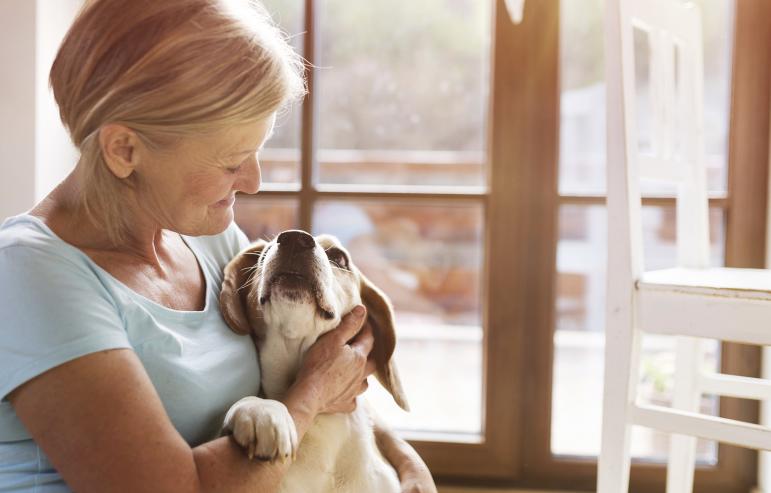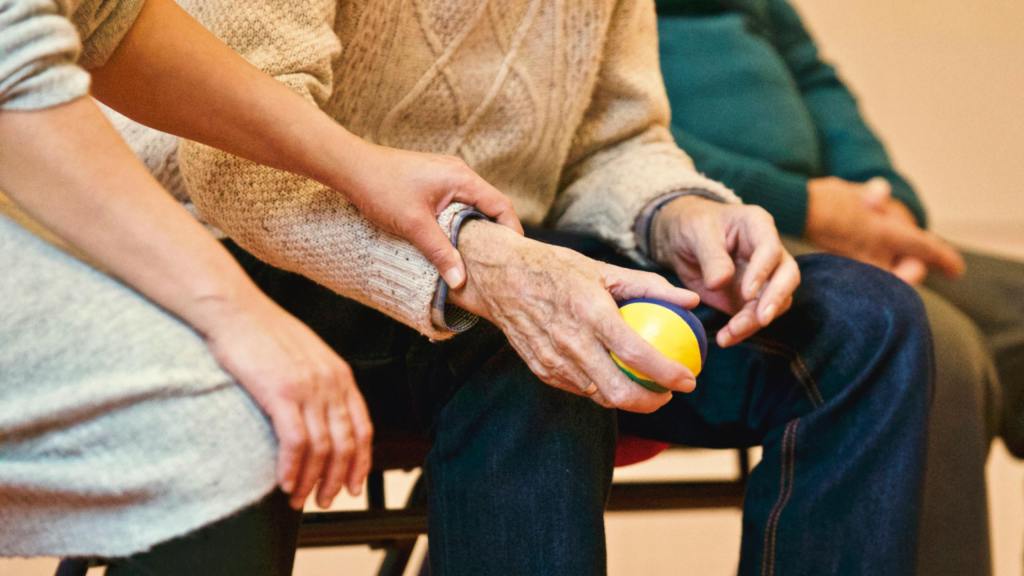
REMEMBERING CINDERELLA: HOW ELDERS CAN BENEFIT FROM PETS
By Sue Gregg, the Midwest Regional Director for Caregiver Homes.
Cinderella was a very smart cockapoo with brown and white curls. Born on January 12, 2000, she was a Y2K puppy. Cinder, as we affectionately called her, was also a dog with a remarkable story and life journey.
My friend’s aunt Carol lived in a Sun City retirement community in Arizona and had purchased Cinderella from a breeder. Cinder traveled by plane to her new home. The small dog spent all her time with Carol and other elders in this community, and they made a great life together. Unfortunately, within a year, Carol was diagnosed with cancer and passed away. Cinder was without an owner, but not for long.
Carol’s niece volunteered to take care of Cinder in Cleveland, Ohio—another long trip and colder climate (neither of which Cinder enjoyed). But soon a move to a high-rise apartment necessitated yet another new home for Cinder.
During that time, I was trying to convince my mom to get a new pet. We had a dog growing up, but after Patches passed, my mom swore she would never have another dog. As much as I tried, there seemed to be no dog in her future—just an aquarium of goldfish, not suitable for petting.
While my friend tried to figure out where Cinder’s next home would be, I asked my mom if she would consider being a foster owner until a suitable home was found. She reluctantly agreed and the first trial meeting was set up. Once Cinder saw my mom, she immediately jumped into her lap and into her life.
While pets might not be the right fit for every elder, there were so many wonderful benefits of this relationship. My mom was a widow who lived alone and had very established routines. It was great to see her engaged with Cinder. There were the walks around the neighborhood, rides to the grocery store, and wake-up and bedtime routines. Family parties included invitations to bring Cinder along, and the kids loved a little dog (though the little dog did not think too much of the fast-paced kids).
Cinder provided an ice breaker when meeting new people. Cinder was the protector, the meal companion and the good listener regardless of the topic. She was someone to come home to, to talk to, and to be responsible for. They remained constant companions for 9 years until my mom’s passing two and half years ago.
Cinder’s fourth and final home was with me. As we see with anyone who is aging, Cinder’s medication list grew and her chronic illnesses needed to be managed, like congestive heart failure, renal failure, cataracts and deafness. But I was happy to care for Cinder because of her years of service caring for my mom. Cinder passed before her 14th birthday. Though it is hard to say goodbye to a loyal companion, I am so grateful to Cinder for the joy and purpose she brought to my mom’s life.
More insights like this:
-

Helping an Aging Loved One Through Declining Mental Health
Read more: Helping an Aging Loved One Through Declining Mental HealthMental health challenges can impact anyone at any time of life. However, older adults tend to be more vulnerable to depression and other mental illnesses, on average, with 14% of adults aged 60 or older suffering from a mental disorder. “If you recognize or hear from a loved one that their day-to-day life is significantly…
-

Delirium vs. Dementia: Causes, Symptoms, Treatments, and Preventative Measures
Read more: Delirium vs. Dementia: Causes, Symptoms, Treatments, and Preventative Measures5 Key Things Family Caregivers Need to Know About Delirium and Dementia Onset and Course Are Key Clues That Caregivers Should Watch Closely Delirium develops suddenly (hours or days) and often fluctuates; dementia progresses gradually over months or years. Acute changes in thinking or attention should trigger urgent medical evaluation. Delirium and Dementia…
-

7 Immune System Booster Tips for Seniors
Read more: 7 Immune System Booster Tips for SeniorsThe immune system is the body’s first line of defense against viruses and infections, but the aging process can weaken the immune system. Throughout the COVID-19 pandemic, this became an increased concern for the caregivers of older or immunocompromised adults, as the risk of more severe symptoms and outcomes was much higher in these…